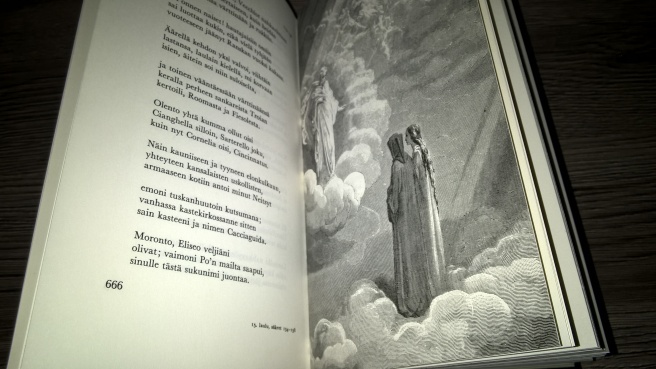Jumalainen Näytelmä [Divina Commedia]
Dante, WSOY, 1963
This book was an impulse buy. Perhaps my subconscious was telling me that I should read more classics. Perhaps, as a semi-heavy-metal-dude, I was intrigued by Dante’s description of hell.
In any case, speaking of classics, the first thing that came to my mind while reading this was that is this really all that it takes to write a revered piece of world literature? I’m not trying to say that Dante has done bad job but somehow the contents of the book felt much lighter than I expected. One possible reason for this is the translation. I read Elina Vaara’s later translation that emphasizes readability instead of rhyming and it might well be the case that most of the poetic genius is just lost somewhere in translation. On the other hand, I am a big friend of readability so I should not really complain here.

The book is divided in three parts where Dante travels through hell (or inferno), purgatory, and paradise. All of these include multiple different ‘levels’ or ‘circles’ with various punishments and pleasures for different deeds and thoughts. The basic structure of the book is quite repetitive and goes roughly like this: Dante and his guide enter a level, dead souls are surprised because Dante has a shadow (the dead have no real bodies and thus no shadows either), Dante explains how he is actually still alive and continues by asking if the dead know anyone who is of Latin origin, and, finally, the dead name some famous historical characters as well as a few contemporaries too.
The hell section is through and through political with a massive amount of references to the 14th century Italian politics. My copy had a nice introduction and commentary parts that explained what is actually going on and I admit that otherwise it would have been impossible to know who is who and why Dante wishes the worst for them. The punishments are fairly imaginative, although some of the real-life torture methods seem even crueler than Dante’s imagined ones. For those who wait for the hell to freeze over, that has already happened. According to Dante, Satan (or Dis) resides in the middle of a frozen lake. He is a three-headed monster that eternally chews on Judas – for obvious reasons – and Brutus and Cassius for taking part in Caesar’s assassination. There are couple of interesting points that can be gleaned from this. Firstly, the lowest low of hell is already full as Satan has only three mouths and they were already filled with the aforementioned traitors. In other words, the greatest sins have already been done. Secondly, one does not need to be a Christian to be punished. Brutus and Cassius lived before Christ or Christianity, with no knowledge of the hell, and they still end up into the mouth of the devil himself. On the other hand, and quite unfairly, one does need to be a Christian to be saved. If you lived a virtuous life – like certain Creek philosophers did – the highest state you can reach without faith is a quiet limbo. Purgatory and paradise are open only to the faithful.
The purgatory section is more psychological. It is here that vices are whet from the souls through almost endless repetition of hard and arduous tasks. Souls are in some sense refined to be ready for the paradise. Personal and selfish wants and wishes are eroded away and the souls are made to understand the will of God. Those who had been virtuous enough in their lives or who have gone through the purgatory find their place in paradise where they circle and praise God, again on different levels. In a less spiritual reading, if hell was highly political, purgatory and paradise offer something more akin to Dante’s praise for his beloved Beatrice who had died before Divine Comedy was written. In fact, to me the whole book felt less like an actual description of Christian cosmology – although Dante surely offers an interesting glimpse to the world view of his time – but rather like a poet’s witty attempt to address his political enemies and honour his lover without being too direct or making himself open for direct criticism.
What I found extremely interesting was Dante’s struggle to try to fit free will together with God’s will. Philosophically speaking, he does not offer any good answers – an angel said it, it must be true – but the questions he poses are interesting and they certainly trouble him a lot. For Dante it is unquestionable that humans have a free will. However, this needs to be somehow fitted together with God’s omnipotence. Perhaps this is the reason why the paradise ends up being a highly impersonal place. Although the lack of personality might seem disturbing, this is solved by positing God’s all-encompassing love as something that is more desirable and enjoyable than anything else, the highest good. In the end, we just need to (freely) understand what is actually good for us.
Overall, I quite enjoyed Dante’s adventures. He does not try to hide his weaknesses before all the horrors and he does not claim to fully understand what he experiences. I liked the way he occasionally speaks directly to the reader, mostly sayingemphasizing that the things he has seen have to be seen to be believed. As all sections end with the word ‘stars’, I would give this book three stars.
